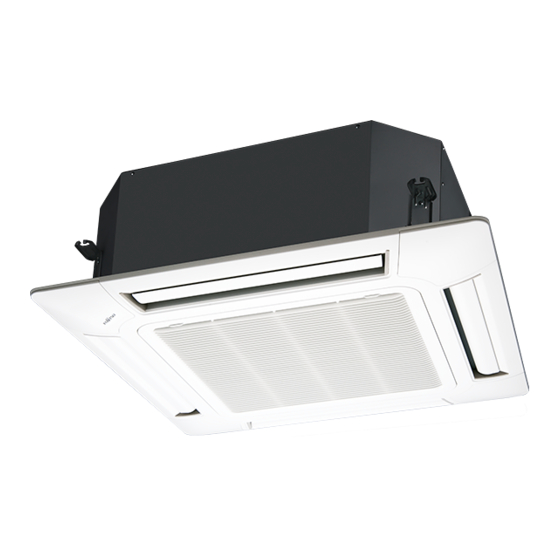AirStage AUXD24GALH Manuel d'installation - Page 7
Parcourez en ligne ou téléchargez le pdf Manuel d'installation pour {nom_de_la_catégorie} AirStage AUXD24GALH. AirStage AUXD24GALH 17 pages. Indoor unit (cassette type)
Également pour AirStage AUXD24GALH : Manuel d'utilisation (6 pages)

4.3.3. Pipe connection
Be sure to install the pipe against the port on the indoor unit and the outdoor unit
correctly. If the centering is improper, the fl are nut cannot tightened smoothly. If the
fl are nut is forced to turn, the threads will be damaged.
Do not remove the flare nut from the indoor unit pipe until immediately before
connecting the connection pipe.
Do not use mineral oil on fl ared part. Prevent mineral oil from getting into the system
as this would reduce the lifetime of the units.
Hold the torque wrench at its grip, keeping it at a right angle with the pipe, in order to
tighten the fl are nut correctly.
(1) Detach the caps and plugs from the pipes.
(2) Center the pipe against the port on the indoor unit, and then turn the fl are nut by
hand.
Connection pipe
(Liquid)
(3) When the fl are nut is tightened properly by your hand, hold the body side coupling
with a separate spanner, then tighten with a torque wrench. (See the table below for
the fl are nut tightening torques.)
Torque wrench
Indoor unit pipe
(Body side)
Flare nut [mm (in.)]
6.35 (1/4) dia.
9.52 (3/8) dia.
12.70 (1/2) dia.
15.88 (5/8) dia.
19.05 (3/4) dia.
4.4. Installing heat insulation
After checking for gas leaks (refer to the Installation Manual of the outdoor unit),
perform this section.
Install heat insulation around both the large (gas) and small (liquid) pipes. Failure to
do so may cause water leaks.
After checking for gas leaks, insulate by wrapping insulation around the 2 parts (gas and
liquid) of the indoor unit coupling, using the Coupler heat insulation.
After installing the Coupler heat insulation, wrap both ends with vinyl tape so that there is
no gap.
Cable tie (Large)
(Accessories)
Coupler heat
insulation
Body
Be sure to overlap
the insulation
Must fi t tightly against body without any gap.
CAUTION
Connection pipe (Gas)
Tighten with 2 wrenches.
Holding wrench
Flare nut
Connection pipe
Tightening torque [N·m (kgf·cm)]
16 to 18 (160 to 180)
32 to 42 (320 to 420)
49 to 61 (490 to 610)
63 to 75 (630 to 750)
90 to 110 (900 to 1,100)
CAUTION
No gap
Coupler heat
insulation
CAUTION
5. INSTALLING DRAIN PIPES
WARNING
Do not insert the drain piping into the sewer where sulfurous gas occurs. (Heat
exchange erosion may occur)
Insulate the parts properly so that water will not drip from the connection parts.
Check for proper drainage after the construction by using the visible portion of
transparent drain port and the drain piping fi nal outlet on the body.
Do not apply adhesive agent on the drain port of the body. (Use the attached drain
hose and connect the drain piping)
• Install the drain pipe with downward gradient (1/100 to 1/50) and so there are no rises
or traps in the pipe. Unsmooth draining caused by accumulated water fl ow in the pipe
may cause clogged drain.
• Use general hard polyvinyl chloride pipe (VP25) [outside diameter 32 mm].
• When the pipe is long, install supporters.
• Do not perform air bleeding. Drainage may be blown out.
• Always heat insulate the indoor side of the drain pipe.
• If it is impossible to have suffi cient gradient of pipe, perform drain lift-up.
Drain pipe
Hanging fi ttings
VP25 (O.D. 32 mm)
Downward gradient 1/100 to 1/50
PROHIBITED:
Rise
When lifting up drain:
• Height of inclined pipe should be less than 850 mm from the ceiling. A rise dimension
over this range will cause leakage.
• Lift up the pipe vertically at the position of 300 mm or less from the unit.
300 mm or less
VP25 (O.D. 32 mm)
local arrangement
VP30 (O.D. 38 mm) or more
850 mm or less
Downward gradient 1/100 to 1/50
CAUTION
Pipe size
VP25 (O.D. 32 mm)
1.5 to 2 m
Trap
Air bleeding
Downward gradient
1/100 to 1/50
850 mm or less
Horizontal or
upward gradient
En-6
